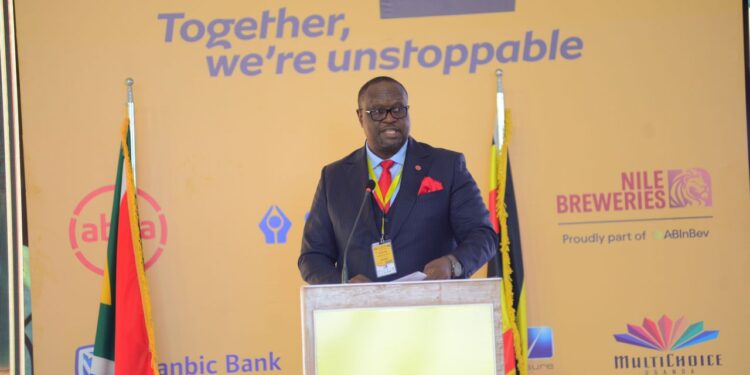Uganda South Africa Trade and Investment Summit organized by the Government of Uganda, MTN Group, Absa Bank Uganda and various South African owned business entities kicked off at Speke Resort Munyonyo.
The discussions were focused on how to improve relations between the two countries with the aim of enhancing bilateral trade and ultimately economic growth.
Leading a high-powered delegation from the government of South Africa, Hon. Angela Thokozile Didiza, the Minister of Agriculture, Land Reform and Rural Development noted in her remarks the need for African countries to collaborate to build back better following the impact of economic shocks like the Covid-19 pandemic and the shocks to the global chain as a result of the Russia Ukraine war.
“We foresee key opportunities to trade among each other reinforced by the Africa Free Continental Trade Area (AFCFTA) to achieve the vision of the Africa we want by 2063 and work together to exploit our rich African natural resources to take advantage of economic opportunities abounding within the African population which currently stands at a billion citizens and growing. Strengthening bilateral trade creates a solid basis for the AFCFTA,” she said.
The summit has a focus on attracting greater trade and investment with a focus on agriculture, tourism and hospitality, ICT and mining.
Hon Bright Rwamirama, the Minister of State for Agriculture, Animal Fisheries and Industry noted that there is need to attract investors who can do value addition to Uganda’s rich agricultural commodities.

“According to our records, Uganda is the second largest producer of coffee in Africa and the number one exporter of coffee from Africa. In 2022, we earned approximately USD860 million from export of coffee. Compared to other coffee producing nations, revenues earned from our coffee exports remain low because of limited value addition. There is need to attract investors who can do value addition to Uganda’s rich agricultural commodities,” he said.
The gathering which has attracted participation from the business community in both Uganda and South Africa received information from government agencies and authorities regarding viable opportunities to explore for investment.
According to the Uganda Investment Authority, there is untapped potential and significant opportunities in coffee, cocoa, maize and bananas as key agricultural commodities that require deliberate value addition and have had good yields at a national level over the years.
From the various deliberations, it became increasingly evident that a key opportunity for collaboration is agriculture.
During a panel discussion, various Ugandan entrepreneurs pointed out the need for financial institutions to provide the required financing to explore greater trade opportunities.
Absa Bank Uganda committed to continuing to finance the opportunities in the sector providing financial solutions including working capital and trade financing.
“UGX12 trillion of total private sector lending across the sector is to agriculture reflecting the commitment to financing agriculture despite the associated risks. Our lending to agriculture continues to grow and currently taking up 10% of lending on our loan book. Lending to small scale farmers remains a challenge however we have embraced this challenge and found solutions to reduce the associated risks through various financial solutions including value chain financing which allows us to finance the entire agriculture eco-system. Trade and working capital finance are also viable financing options available to agriculture sector,” said Mumba Kalifungwa, Managing Director, Absa Bank Uganda.
Overall, the summit deliberations revealed the need to share best practice among players in the agriculture eco-system and have deliberate conversations targeted at finding unique African solutions towards addressing overarching issues such as quality and standards, enhancing agricultural productivity, inclusive growth to support growth of even small-scale farmers.
Key to the summit agenda to address the balance of trade between Uganda and South Africa is the need to nurture anchors for trade.
“Key to enhanced trade is the need to establish enabling policies and the need for the business community to understand policies and laws in each country that support trade and investment including land tenure, licensing, tax laws and other compliance matters that companies must adhere to. We also need to ensure that there is supporting infrastructure, financing, and mechanisms for conflict resolution and mediation to address mistrust and problems that may arise,” said Hon. Angela Thokozile Didiza.









